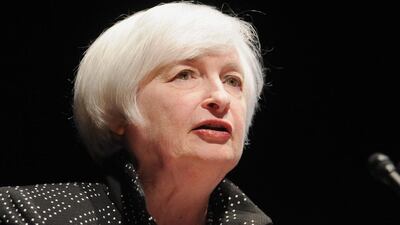The United States Federal Reserve’s decision not to raise benchmark interest rates this month – unchanged at zero since 2008 – was cause for celebration in emerging markets. However, comments by the Federal Reserve chairwoman Janet Yellen that the Fed was on track to raise rates later this year threw some cold water on the celebrations as the decision will create international market turmoil.
Emerging market economies in Turkey, Brazil and South Africa have tied their short-term economic fates closely to any changes in the Fed’s rates. Raising rates that will dry up cheap money is bound to exacerbate domestic instability, which will have direct geopolitical consequences in Africa and, more importantly, the Middle East.
Speculation over the higher cost of borrowing has been a contributing factor in serious currency depreciation over the past several months for the South African rand and Turkish lira. While weak currency is not necessarily a bad thing – in some respects it makes exports more competitive – the issue highlights leadership shortcomings that reveal a fractured political landscape.
In South Africa, years of mismanagement by the government of president Jacob Zuma has left the economy in a dire state. Continuing power shortages, which are primarily the result of ageing infrastructure, are the most visible examples of Mr Zuma’s inability to govern, or even keep the lights on.
Falling prices for raw commodities along with labour unrest – as demonstrated in the killing of over 30 miners during a labour strike in 2012 at the Marikana platinum mine, which was the single most lethal use of force by South African security forces against civilians since 1960, have left the economy in disarray. In one of Africa's largest economies, these events are already having an effect on the continent as a whole. The international community can ill afford a redrawing of South Africa’s economic structure towards a nationalisation model similar to Robert Mugabe's Zimbabwe as has been proposed by Mr Zuma’s opponents in parliament. Rate hikes will amplify domestic upheaval at home as it will weaken the country's borrowing power.
Turkey, on the other hand, has more to lose by a Fed rate hike. Turkish president Recep Tayyip Erdogan’s Justice and Development Party (AKP) rose to power on an economic platform that promised neoliberal growth with a socially conservative Muslim agenda.
Under his leadership, Turkey was able to grow its economy during the depths of the global economic crisis of 2008-09 by borrowing large sums of foreign capital. Turkey’s economic expansion was, therefore, fuelled by a steady flow of cheap money spurred by the Fed’s historically low interest rates.
Recent events in Turkey have destroyed previously strong investor confidence. Ankara and the Kurdistan Workers Party (PKK) renewed their violent conflict this summer, Mr Erdogan’s political ambitions have been sidetracked because of the AKP losing a majority in last summer’s parliamentary elections, which has resulted in snap elections scheduled for November 1, and the war in Syria and Iraq remains at the heart of a destabilised region on Turkey's southern border.
The result is that the Turkish lira is at a record low against the US dollar. According to the Turkish ministry of economy, there has been a 22 per cent decrease in foreign direct investment in the first half of this year. Compounding matters, local capital is fleeing at an astounding rate. More than $11.3 billion (Dh41.5bn) has left the country in the past two and a half years.
Turkey's thirst for foreign capital has not waned during this rocky period. Thanks to Mr Erdogan’s grand vision for Istanbul, the city has several expensive infrastructure projects under way, including a third bridge spanning the Bosphorus, an underwater tunnel linking the European and Asian continents, and a new airport that will be Europe’s largest. None of these projects is cheap, and debate about funding them fuelled anti-government protests in 2013.
A domestically weak and crisis-prone Turkey is disastrous for the region. The US-led anti-ISIL coalition, for one, needs Turkey to remain an active partner in the war against the militants in Syria. Sustained fighting with the PKK, which some analysts argue stokes nationalist sentiment in Mr Erdogan’s favour, only draws Ankara’s attention away from the bigger and more important regional challenges.
Sustained economic decline is also pushing Turkey towards a closer partnership with Russia, whose intentions in Syria remain at odds with the West. Current economic trends are unfavourable for Turkey to reverse course, at least in the short term. What the country needs now is exactly what it appears to be losing: strong leadership.
When Mrs Yellen alluded to market instability abroad when announcing that the benchmark interest rate would remain unchanged, she had her eye on China. Yet the effects of American economic policy in Turkey and South Africa could end up changing critical geopolitical calculations in the Middle East.
While financial markets expect rates to stay low for years to come, emerging markets have pushed themselves into a corner and, as such, the Fed’s decisions will have serious ramifications far beyond market trading floors.
jdana@thenational.ae
On Twitter: @ibnezra

